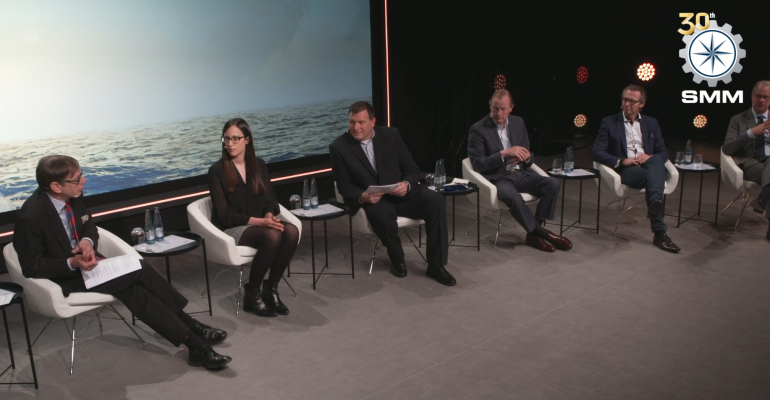Speaking at a press event in Hamburg ahead of the SMM trade fair and conference this September, Dr. Martin Stopford, Non-Executive President at Clarkson Research Services said earnings across the major shipping segments averaged around $40,000 per day compared to between $10,000 and $15,000 per day over the past seven or eight years, but the cost of decarbonising is much greater.
“I thought it'd be interesting to see how much it will cost to power one of these big 23,000 teu containerships. I took one that was delivered last year, which was burning 200 tonnes a day at 22 knots, which is pretty economical. To produce 200 tonnes a day of replacement for heavy fuel oil, you need 400 tons a day of methanol. To generate 400 tons of methanol, you'd need 36 10MW offshore wind turbines. The cost of the wind turbine field offshore that size is about a billion dollars. Running costs are about $100,000 a day.”
Cristina Aleixendri, COO Bound4Blue, who will be speaking at the global maritime environmental congress (gmec) at this year’s SMM, said there were solutions available today if we look at the issue as an energy problem rather than a fuel one.
“You have better optimization, you have energy efficiency, you have wind propulsion which can offer 30 to 40% of the energy required by the vessel. Then if you leave the rest for alternative fuels, then it's much easier to achieve,” said Aleixendri.
Using wind power directly onboard a vessel makes sense for those operating in appropriate weather conditions as it removes the inefficiency of generating and transmitting power, then creating fuels. The technology also removes infrastructure overheads for a significant portion of the ship’s energy needs.
While so many decisions on decarbonisation hang over owners and operators, there are plenty of movements in the market to preoccupy the industry too.
The last time energy, gas and oil prices were so high was in 1979, said Stopford, which had an acute deflationary effect on the economy.
“It triggered some economic developments which gave us a very nasty recession in the 1980s. And I think there's a concern that inflation is now going up—the United States is almost into double digits—and interest rates are going up. In March the Feds announced that they were going to go in for quantitative tightening the opposite of quantitative easing… this is all discouraging, frankly,” said Stopford.
Knut Ørbeck-Nilssen, CEO Maritime, DNV agreed that the market was changing.
“The world is in transition. It's transforming and so is the maritime and shipping industries. There are really three tectonic shifts that are influencing the industry right now. It's the unpredictable markets that we've seen for several years, together with political shocks, but it's also how decarbonisation is really setting the agenda together with the ESG revolution.
“And the third tectonic shift is really around technology, typically fuels, digitalization, propulsion, etc. So it's really difficult for the maritime community to make the right strategies in a period of great uncertainty that we have now.
“It's difficult to know whether you should be a first mover, second follower or maybe even delay everything. So in this context, I usually try to emphasize that it's really important that we as an industry also look beyond the maritime industry. We are very much depending on the energy producers, the companies and the infrastructures that will be available to us and the port facilities etc. So this is really a time for collaboration,” said Ørbeck-Nilssen.
Nikolaus Schües, President designate BIMCO & CEO Reederei F. Laeisz said his focus was ensuring a level playing field in the market.
“We don't want distortion of competition. We want the regulatory the regulatory requirements to be practical. We want small organizations to be able to implement we want that the requirements are measurable and implementable.
“The second main aim will be that it that we have global regulation. That will be difficult. One thing we are going to propose is that IMO at least tries to phrase a framework for regional regulation and if we achieve that, I think there is a lot to be done to keep the level playing field,” said Schües.
“For me environmental changes come from discussions, and I think that because of the pandemic and not having SMM, the industry has not engaged all together to have these huge discussions related to the environmental issues. I hope this conversation today that we all had together will be ignited for much more conversation in September,” said Aleixendri.
Aleixendri will be joined by speakers including IMO Secretary Kitack Lim, German Federal Government Coordinator for the Maritime Industry and Tourism Claudia Müller and KfW IPEX Vice President Klaus Schmidberger at this year's gmec on September 7 at SMM 2022. Follow this link for the full programme and speaker information.
Informa Markets/Seatrade co-operate in organising the gmec conference at SMM.
Copyright © 2024. All rights reserved. Seatrade, a trading name of Informa Markets (UK) Limited.
Add Seatrade Maritime News to your Google News feed.  |

